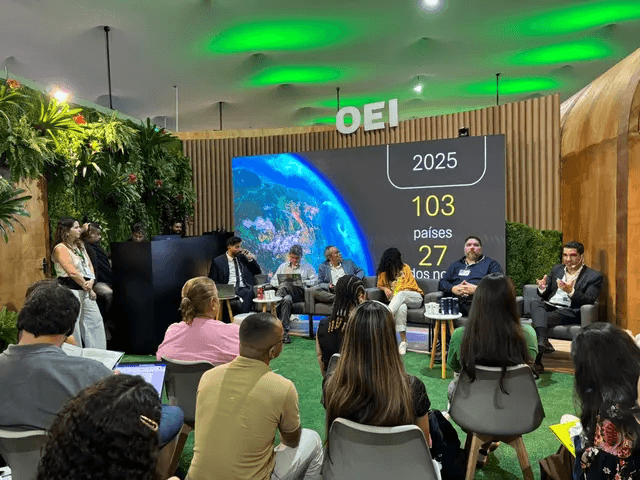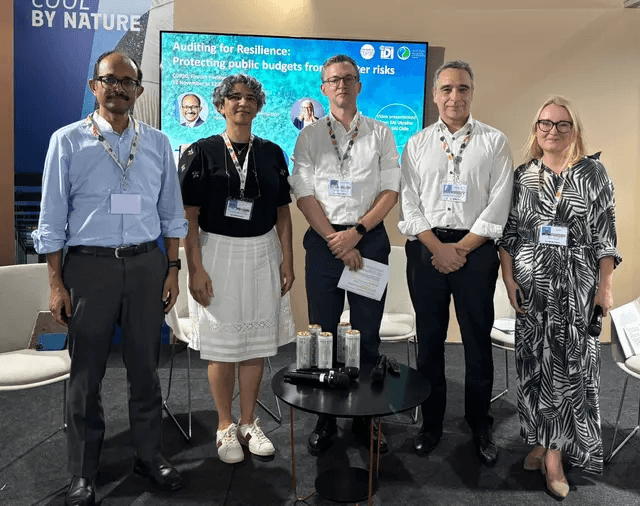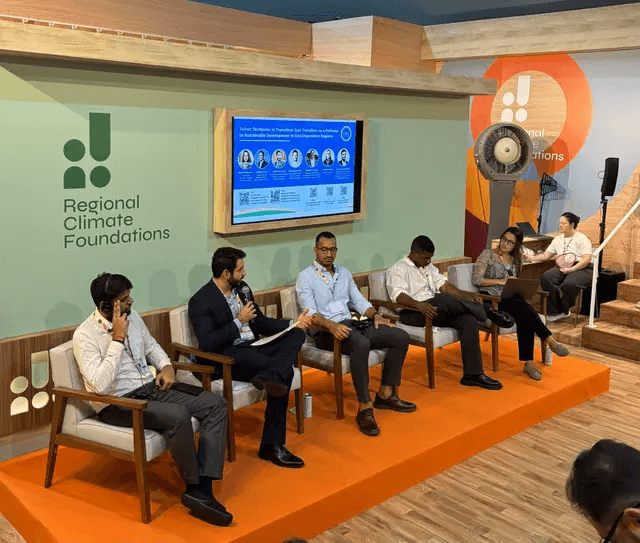TCU Presents Climate Audit and Energy Transition Experiences at COP30
Court auditors took part in international panels on the use of data for climate governance, disaster resilience, and a just transition towards sustainable development
By Secom / Serint
Throughout the week, auditors from the Brazilian Federal Court of Accounts (TCU) are participating in technical debates at the 30th United Nations Climate Change Conference (COP30) in Belém, Pará. The Court is representing the chair of the International Organization of Supreme Audit Institutions (INTOSAI) during the event.
On November 11, Carlos Lustosa, ClimateScanner supervisor at TCU from the Department of Government Audit for Sustainable Development (SecexDesenvolvimento), was one of the panelists in the debate Innovation Ecosystems for Climate Action: Data, AI, and Intelligent Systems , promoted by the Organization of Ibero-American States (OEI) at the Ibero-America Viva Pavilion in the Green Zone. The panel discussed how artificial intelligence, intelligent systems, and the strategic use of data can strengthen climate governance, improve decision-making, and enhance transparency in public policy.

Lustosa presented TCU's experience with ClimateScanner and the Painel ClimaBrasil. The methodology, developed under the coordination of the Court, assessed the maturity of climate governance in more than 100 countries and in all Brazilian states. Tools such as ClimateScanner and Painel ClimaBrasil allow governments, society, and audit institutions to act in an integrated and evidence-based manner, which is essential to achieve sustainable results, he stated.
On November 12, auditor Cíntia Zaira, also from SecexDesenvolvimento, took part in the panel Auditing for Climate Resilience: Protecting Public Budgets from Disaster Risk at the Finland Pavilion in the Blue Zone. During the debate, participants discussed the results of climate adaptation audits conducted by audit institutions in various countries and was moderated by Vivi Niemenmaa, Secretary-General of the Working Group on Environmental Auditing (WGEA).

Cíntia detailed the audit conducted by TCU that assessed the effectiveness of Brazil's actions on climate change adaptation and disaster risk reduction. The audit, carried out by the Audit Department for Urban and Water Infrastructure (AudUrbana) within the framework of the INTOSAI Development Initiative (IDI), covered the period from 2015 to 2024 and analyzed approximately BRL 4.48 billion in federal funds allocated to climate risk management.
"The study concluded that, although legal and institutional frameworks are in place, the practical implementation of disaster risk reduction and adaptation policies still has significant weaknesses. A reactive culture prevails in the country, focused on disaster response rather than prevention. The integration between civil defense and climate change agendas remains limited and needs to advance," she explained.
Also on November 12, auditor Guilherme Souto, from the Department of Government Audit for Energy and Communications (SecexEnergia), participated in the panel Territories in Transition: The Just Transition as a Path for Sustainable Development in Coal-Dependent Regions. The meeting took place at the Regional Climate Foundations Pavilion, also in the Blue Zone, and addressed the challenges and opportunities of a just energy transition in Rio Grande do Sul and emerging economies.

The auditor presented the Court's methodology for assessing energy transition policies, the Practical Audit Guide on Energy Transition. He emphasized that social justice and just transition are central and auditable, going beyond financial analysis and encompassing governance, financing, technology, and the inclusion of vulnerable groups.
Souto also highlighted the complexity of multisectoral governance and the need for coordination among different government levels and audit bodies to ensure equity, continuity, and positive regional impact during the transition.
The effectiveness and social justice of public policies on energy transition depend on the integration of economic development, robust governance, and active listening to the groups affected, he concluded.
Read more at: TCU Inaugural Panel at COP30 Debates Climate Finance and Transparency
Over 90 Countries Lack Specific Knowledge of How Much They Spend to Tackle Climate Change